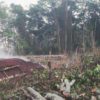Editor
9000 Trees Destroyed Daily by Uganda Prisons
Revelation expose high cost of Uganda’s dependency on backward energy
Uganda Prisons Service uses a staggering 227 tones of wood fuel every day to prepare meals in all the 252 prisons around the country.
This revelation was made by the Commissioner General of Prisons Dr. Johnson Byabashaija during the launch of Rotary Internationals Mission Green campaign that was held at the Uganda Prisons Training School in Luzira. Speaker of Parliament Rebecca Kadaga officiated as chief guest.
According to environmental experts, 227 tones is equivalent to about 9000 mature trees. A mature tree takes not less than 50 years to attain that weight.
Dr. Byabashaija raised alarm about the huge and growing cost of the Prisons dependence on wood fuel on the environment, people’s ways of life and the economy as a whole.
Dr. Byabashaija says he has under his custody 55,600 inmates in all the prisons, a population that is growing by 10 percent per year and exacting even more pressure on the country’s already over-stretched forest cover.
He said something must be done to reverse the situation. He cited the need to promote energy-saving cook stoves across all prisons as one of the remedies to the situation. Energy-saving institutional cook stoves can help to reduce energy loss up 40 percent.
The custodian of prisons however lamented the meagre budget of the institution as a major hindrance to the adoption of better cooking technologies, especially energy-saving cook stoves, which he estimated at just Ushs2billion.
“Yes, we have energy saving stoves but these are in very few prisons, I would probably need 2 billion shillings to establish energy cooking stoves in all my prison facilities but with our meagre budget, we are not able to do that,” Byabashaija lamented.
Speaker Kadaga pledged her support towards Uganda Prisons’ efforts to obtain the funding required to install the cook stoves as a means to reduce the impact of forest destruction for purposes of obtaining biomass for cooking.
At the same event, Speaker Kadaga criticized the Ministry of Environment for failing to plant trees and leaving the job to NGOs yet they draw salaries and other benefits from tax payers.
Dr. Byabashaija said that as the head of prisons, he will avail land for planting of trees in all the 252 facilities that could be used to harvest wood for use in the prisons. He also pledged to support the idea of using prisoners to set up nursery beds as well as planting new forests at subsidized costs.
But the impact of Uganda prisons on Uganda’s vegetation possibly highlights the staggering scale of forest degradation arising from the demand for wood and charcoal not only in homes but also in other institutions like the army and schools.
According to the Uganda National Charcoal Survey 2015-2016, 94% of Ugandans use wood bio mass for cooking energy. This translates into an estimated forest loss equivalent to 115 football fields just for cooking every day – either in the form of firewood or charcoal. In Kampala, the price of charcoal has been rising at about 20% per year largely due to the rising urban population but also due to the rapidly decreasing forest cover across the country.
Experts have warned that at the current level of forest destruction, the demand for wood is expected to triple by 2025, posing a grave threat to the economy and biodiversity as well as making people increasingly vulnerable to disease and poverty.
The National Environment Management Authority (NEMA) estimates that up to 90,000 hectares of natural forest is lost in Uganda every year. The alarming rate of forest destruction, experts say has serious implications such as disruptions in rainfall and hence agricultural activities on which majority of the population thrives.
The loss of vegetation has also been linked with the increased spread of diseases as pathogens that used to reside in forest-based creatures are forced to spread to the general population.
Comments



























